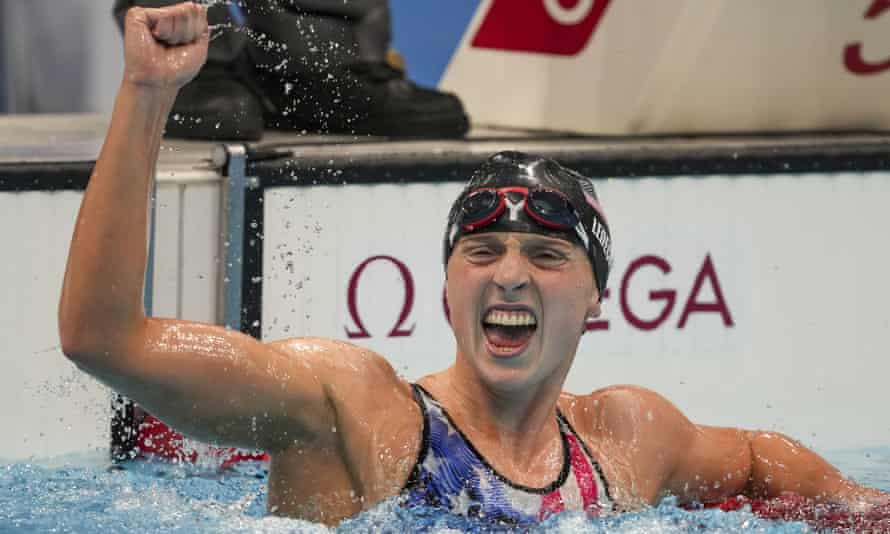Why Are So Many Women Funny About Swimming
I t is funny how times change. The Guardian has obtained a letter, written in 2003 by Dr Richard Budgett, in which he discusses the consequences of trans women competing in women's sport. Responding to a government inquiry, Budgett, then at the British Olympic Association, states: "The effect of allowing male transsexuals to compete as women would be to make competition unfair and potentially dangerous in some sports and would undermine women's sports."
This would have been an interesting answer at the time. It is even more so now. Society has shifted. Language has changed. Budgett is now medical and scientific director at the International Olympic Committee. And his views, according to IOC sources, have evolved – particularly when it comes to finding ways to balance the need for inclusion and fairness in sport. A controversial new IOC framework, drawn up in part by Budgett, adopts a strikingly different stance. While stressing that men's and women's competition should be "fair and safe", it also tells sports that, "until evidence determines otherwise", trans athletes "should not be deemed to have an unfair or disproportionate competitive advantage".
Yet the ink had barely dried on that framework document when the US college swimmer Lia Thomas caused a fresh splash in the debate. For her first three years at the University of Pennsylvania the 22‑year‑old swam as a male competitor, making six Ivy League swimming finals though not setting the world alight. But in the past month, competing as a trans woman after taking hormone replacement therapy to lower her testosterone, she has swum the fastest 200- and 500‑yard times in the US this year.
That, though, tells only half the story. Thomas's 200‑yard time of 1:41:93 ranks as the 17th fastest of all time – less than three seconds off the five‑time Olympic medallist Missy Franklin's US record of 1:39:10. Meanwhile her 500‑yard time of 4:34:06 puts her 21st in history and within striking distance of a record set by Katie Ledecky, who is widely regarded as the greatest female swimmer in the sport's history.
All roads now lead to the NCAA championships in March, where Thomas could become swimming's first transgender All-American champion. It will be a significant moment for sport – and for Thomas, who last week stressed how important it was for her to swim as her "authentic self" and praised the IOC for "promoting inclusivity while keeping competition integrity going".

Others, though, are less happy. According to reports, Thomas's teammates were "in tears" with one explaining: "They feel so discouraged because no matter how much work they put in it, they're going to lose." Meanwhile Swimming World magazine's John Lohn said he was uneasy that Ledecky's record was under threat. "Simply, she is an icon who changed what was perceived to be attainable," he wrote. "The fact that Thomas could break the record of such a once‑in‑a‑generation athlete confirms the biological advantages she possesses, and their power,."
Thomas's surge to the top of the rankings also poses questions of the IOC and NCAA. Remember the female category exists because the performance gap between elite men and elite women is so stark. It starts at around 10%-13% for running and swimming and rises thereafter. That is why most sports require trans women to suppress their testosterone to compete in the female category.
Recent studies, though, suggest that significant strength and muscular advantages remain even after hormone therapy. Thomas's performances appear to back that up. Before transitioning, she was not a serious challenge to male records but is now swimming only 2.6% slower than the current 200‑yard female record. It means, as the developmental biologist Dr Emma Hilton points out, Thomas has gained a significant ranking advantage from switching category.

Is this unfair? In 2003 Budgett thought so. As he put it in his letter: "The BOA believes the effect of allowing transsexuals to compete in their acquired sex would be to make competition unfair for women. The physique determined by two or more decades of life as a male would not be significantly changed (in the case of male to female transsexuals) which would eradicate the concept of a level playing field."
Some will argue that sport is never truly fair, that Michael Phelps's big wingspan gave him genetic advantages too. But male puberty provides such a categorical advantage – in terms of muscle mass, strength, lean body mass and bone density – that it far exceeds the advantage of a few centimetres in arm length.
No magic bullet, no one-size-fits-all policy can satisfy all sides. The issue involves competing rights and strong emotions. Worryingly a recent UK Sports Councils Equality Group report also found that women in sport were told to keep quiet by their national governing bodies and feared abuse on social media if they voiced their opinions.
Yet perhaps times are changing. At the Sport Resolutions dispute resolution service last week several experts were able to discuss openly and courteously what sports should do next. It made for fascinating listening. For David Grevemberg, of the Centre for Sport and Human Rights, inclusion mattered most. And if sport had to radically change, then it should. "Are there ways, that are not infringing on human rights, to create a level playing field?" he asked. "Are there other conditions that we can create – for example staggered starts in the 100m? Or delayed starts?"
Quick Guide How do I sign up for sport breaking news alerts?
Show
- Download the Guardian app from the iOS App Store on iPhones or the Google Play store on Android phones by searching for 'The Guardian'.
- If you already have the Guardian app, make sure you're on the most recent version.
- In the Guardian app, tap the yellow button at the bottom right, then go to Settings (the gear icon), then Notifications.
- Turn on sport notifications.
Meanwhile Joanna Harper, a visiting fellow at Loughborough University and a trans woman, argued for a similar approach to the IOC's 2015 guidance but with trans women required to reduce their testosterone to below five nmol/L for at least 12 months. She said the advantages were "small enough that trans women and cis women can have equitable and meaningful sport".
However, for Dr Nicola Williams, a spokeswoman for Fair Play For Women, the best solution would be for men to "budge up and be more inclusive" by allowing trans women and trans men into an open or universal category, with a separate category exclusively preserved for natal females.
Whatever your view, one thing is clear: this issue is not going away. And Thomas's groundbreaking performances have only made that clearer to Richard Budgett, the IOC and the rest of us.
Source: https://www.theguardian.com/sport/blog/2021/dec/13/swimming-trans-debate-starting-to-change
0 Response to "Why Are So Many Women Funny About Swimming"
Post a Comment